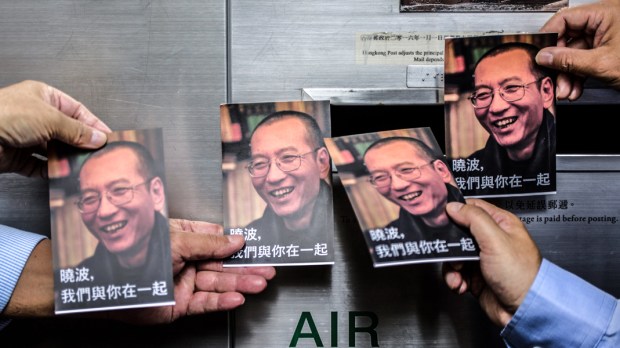Liu Xiaobo won the 2010 Nobel Peace Prize for “his long and non-violent struggle for fundamental human rights in China.” But he was unable to travel to Stockholm to accept the prize because he was just beginning an 11-year sentence in a Chinese prison.
Now the 61-year-old is dying of cancer.
On Friday night, the retired Catholic bishop of Hong Kong, Cardinal Joseph Zen Ze-kiun, led an ecumenical prayer gathering for Liu, who was recently released from prison in the northeast of China, and for his distraught wife.
Cardinal Zen was joined by Protestant Reverend Wu Chi-wai at the July 7 gathering of 300 Christians at St. Vincent’s Chapel, UCANews reported. The gathering was just a week after Chinese President Xi Jinping visited Hong Kong to mark the 20th anniversary of Great Britain’s handover of the territory to the People’s Republic. Xi issued a stern warning to Hong Kongers against politicizing disputes or challenging the authority of the central government the New York Times reported.
Organizers of Friday’s prayer service—the Catholic diocese’s Justice and Peace and Labor Affairs commissions along with four Protestant groups—invited attendees to write words of comfort on postcards to be sent to Liu and his wife Liu Xia, who has suffered from depression due to her being under house arrest since 2010, UCANews noted. Cardinal Zen wrote to the couple that the hearts of all Catholics in Hong Kong are linked with them.
Liu Xiaobo is like the Prophet Jeremiah, the cardinal said.
“You are like the sheep waiting to be killed,” he wrote. “We have begged God’s justice for you. But your wisdom reminded us the mission of a prophet naturally includes suffering. We dedicate you and your wife to God for the renewal of our country.”
Liu is in grave condition, and his supporters have begged Chinese authorities to let him receive medical treatment abroad, UCANews said:
Among those voices are two medical specialists from the United States and Germany who have countered calls saying he is too ill to undergo a trip abroad. The two foreign doctors have joined Chinese counterparts in a medical team formed to offer treatment to Liu. The First Hospital of China Medical University in northeastern Shenyang province claimed on July 8 that “the transportation process for the patient is not safe.” However, the foreign specialists countered the comment that he “can be safely transported with appropriate medical … care and support.” “However, the medical evacuation would have to take place as quickly as possible,” said the two doctors — Joseph Herman of the University of Texas and Markus Buchler, chairman of Heidelberg University’s department of surgery — in a statement.
The prayer gathering was the second event held by the Justice and Peace commission and human rights groups in Hong Kong since Liu’s release from prison on June 26.
According to the Nobel website, Liu Xiaobo has fought for most of his adult life for a more open and democratic China. After studying literature and philosophy at Jilin University in his native northeastern city of Changchun, he worked as a literary critic and university lecturer in Beijing. He took a doctorate in 1988, after which he was a guest lecturer at universities in Europe and the U.S. He took part in the student protests in Tiananmen Square in 1989, for which he was sentenced to two years in prison. Later he served three years in a labor camp for criticizing China’s one-party system.
In 2008, Liu was a co-author of Charter 08, a manifesto which advocates the gradual shifting of China’s political and legal system in the direction of democracy. He was arrested in December of that year and sentenced a year later to eleven years’ imprisonment for undermining the state authorities. Liu has constantly denied the charges. “Opposition is not the same as undermining,” he has said.

